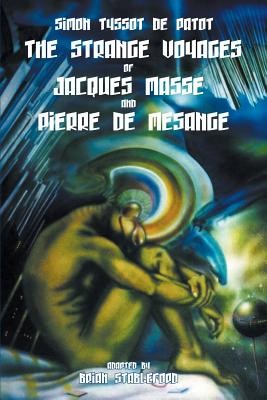
- We will send in 10–14 business days.
- Author: Simon Tyssot De Patot
- Publisher: Hollywood Comics
- Year: 2015
- Pages: 447
- ISBN-10: 161227370X
- ISBN-13: 9781612273709
- Format: 15.2 x 22.9 x 2.6 cm, minkšti viršeliai
- Language: English
- SAVE -10% with code: EXTRA
The Strange Voyages of Jacques Masse and Pierre de Mesange (e-book) (used book) | bookbook.eu
Reviews
Description
In Voyages and Adventures of Jacques Massé (c.1710), Simon Tyssot de Patot dispatched his protagonist to an imaginary land in an heretofore unknown austral continent, where he comes across a "lost world" utopian civilization inhabited by strange creatures that have survived from prehistoric times. The text also includes an early appearance by the Wandering Jew with a visionary narrative attributed to the folklore of the polar continent, in which a character discovers a subterranean portal to "the abode of the blessed." Finally, in Discoveries in the Region of the North Pole by the Reverend Father Pierre de Mésange (1720), Tyssot's eponymous hero discovers a secret underground kingdom inhabited by the descendants of African colonists who left their homeland four thousand years earlier, and spends several years recording their stories and fables. Written in the early years of the 18th century these two novels constitute is a truly remarkable achievement, marking a highly significant watershed in the evolution of literary accounts of imaginary voyages, predating Jonathan Swift's satirical account of the travels of Lemuel Gulliver, published in 1726, and Jules Verne's classic Journey to the Center of the Earth by 140 years!
EXTRA 10 % discount with code: EXTRA
The promotion ends in 21d.07:17:32
The discount code is valid when purchasing from 10 €. Discounts do not stack.
- Author: Simon Tyssot De Patot
- Publisher: Hollywood Comics
- Year: 2015
- Pages: 447
- ISBN-10: 161227370X
- ISBN-13: 9781612273709
- Format: 15.2 x 22.9 x 2.6 cm, minkšti viršeliai
- Language: English English
In Voyages and Adventures of Jacques Massé (c.1710), Simon Tyssot de Patot dispatched his protagonist to an imaginary land in an heretofore unknown austral continent, where he comes across a "lost world" utopian civilization inhabited by strange creatures that have survived from prehistoric times. The text also includes an early appearance by the Wandering Jew with a visionary narrative attributed to the folklore of the polar continent, in which a character discovers a subterranean portal to "the abode of the blessed." Finally, in Discoveries in the Region of the North Pole by the Reverend Father Pierre de Mésange (1720), Tyssot's eponymous hero discovers a secret underground kingdom inhabited by the descendants of African colonists who left their homeland four thousand years earlier, and spends several years recording their stories and fables. Written in the early years of the 18th century these two novels constitute is a truly remarkable achievement, marking a highly significant watershed in the evolution of literary accounts of imaginary voyages, predating Jonathan Swift's satirical account of the travels of Lemuel Gulliver, published in 1726, and Jules Verne's classic Journey to the Center of the Earth by 140 years!


Reviews